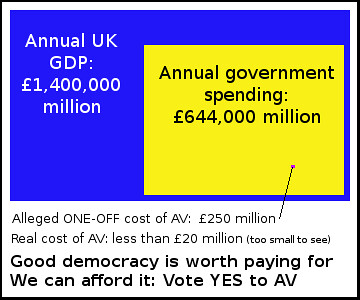Two weeks ago, I noted that, apparently lacking good arguments in favour of FPTP, the No2AV campaign were instead campaigning on cost - and had significantly exaggerated the cost through a mix of accounting fraud and the political technique commonly known as "making stuff up".
Fortunately for No2AV, the Yes campaign seems determined not to capitalise on this mistake.
It should be a major mistake - if you start complaining about the cost of democracy, what other "cost saving" measures are you willing to entertain? Less frequent elections? Increased restrictions on suffrage? Dictatorship? We don't have democracy because it's cheap but because it's worth it.
Rather than pointing this out - and indeed, pointing out that even the massively inflated £250 million price tag is insignificant - the Yes To Fairer Votes campaign have instead chosen to ... complain to the Advertising Standards Authority
The ASA replied to point out that they don't regulate political campaigning, to which the Yes campaign's response was to start a petition asking them to start doing so.
Yes. Really.
Reasons this is a major mistake include:
- The ASA doesn't regulate political campaigning, and it would probably need legislation to give it that power. Chances of this happening before 5 May: nil
- The ASA takes months to make decisions over commercial advertising. Chances, even if it decided to unilaterally take power over political campaigning tomorrow, of it returning a verdict before 5 May: nil
- The ASA's typical verdict, in the cases where an advert is found to be misleading, is an instruction not to run an advert making that claim again. This is virtually useless, of course, since everyone has already seen it. Indeed, there are a few companies who specialise in exploiting this commercially. Chances of an ASA ruling, even it had the powers and speed to make it before 5 May, making any difference: nil
They should be taking this major opportunity to portray the No campaign as self-admittedly anti-democratic. They should be pointing out that we can afford a better democracy. Instead, they're chasing after a giant red herring.
Just in case it makes it clearer, here's a quick picture.
Edit: As MarkWadsworth points out, GDP is around £1,400 billion, not £2,250 billion. I've updated the graphic, and corrected the figures in the rest of the post.
Description: Most of the image is filled with a large blue rectangle, labelled "Annual UK GDP: £1,400,000 million.
Inside that is a smaller yellow rectangle to scale with the rectangle labelled "Annual government spending: £644,000 million"
Inside the yellow rectangle, barely visible, is a tiny purple rectangle (again, to scale). An arrow points to it indicating that this is the £250 million alleged cost of AV.
Below the diagram, the text:
"Real cost of AV: £20 million (too small to show)", and then in larger type "Good democracy is worth paying for. We can afford it: Vote YES to AV."
£20 million is probably an overestimate too, but should comfortably cover the slightly larger ballot papers needed, any voter education campaign, user research into the best format of ballot paper, and other one-off transitional costs.
If we can't spend - once, not every year - around a fifth of a percent of a percent of our national GDP on improving the voting system (or even a fiftieth of a percent, if you accept the massively inflated figure), then we are basically concluding that democracy is too expensive in general1.
This sort of campaign - and the Yes campaign can afford better graphics than I can put together in a few minutes - could completely nullify the No campaign and leave them without much of an argument.
It should be an extremely easy argument to win, but the Yes campaign seems determined to lose it anyway - I agree with Matt Wootton's assessment that the Yes campaign simply does not understand how to run a political campaign. (Their letter-writing to the BBC over the use or otherwise of 'reform' is much the same)
So, that delicious red herring?
There is, absolutely, a strong argument that political campaigning should be regulated to make sure that candidates/supporters can't intentionally deceive the electorate.
In practice, though, there's no reasonable way to do this for a referendum. There is no candidate, and there is no extent to which a supporter could falsely campaign that would make it proportionate to disqualify a referendum option. Fines or disqualification from further campaigning on the issue are not major deterrents in the context of a one-off referendum campaign. (Whereas in elections, which are regulated somewhat, losing the seat that you won can be a deterrent)
Additionally, there's the timescale. The determination of the election court over former MP Phil Woolas's campaigning took months to conclude that he had intentionally misled the electorate about his opponent's character. Likewise, any robust system for determining whether the electorate were deceived (or whether the disputed point was just fair differences in opinion), and whether this was intentional, would take months with respect to a referendum. The capacity to respond within a couple of days would be virtually impossible (indeed, submitting vexatious requests would be a good way to slow the system and your opponents even if it could respond this quickly)
The ASA certainly isn't the right body to be doing this, but there aren't any other suitable ones either.
Footnote
1If you genuinely prefer FPTP to AV, of course, then any money spent on switching to what, for you, is an inferior voting system is obviously mis-spent. But it would also be a bad idea for you to switch to AV even if it turned out to save a little money. Either way, the financial argument isn't compelling.
